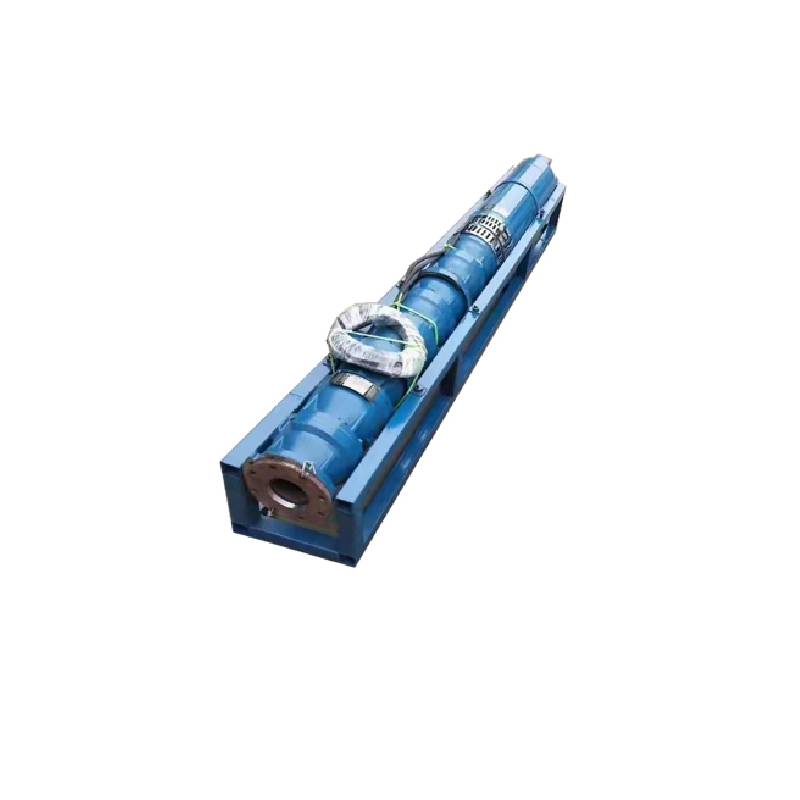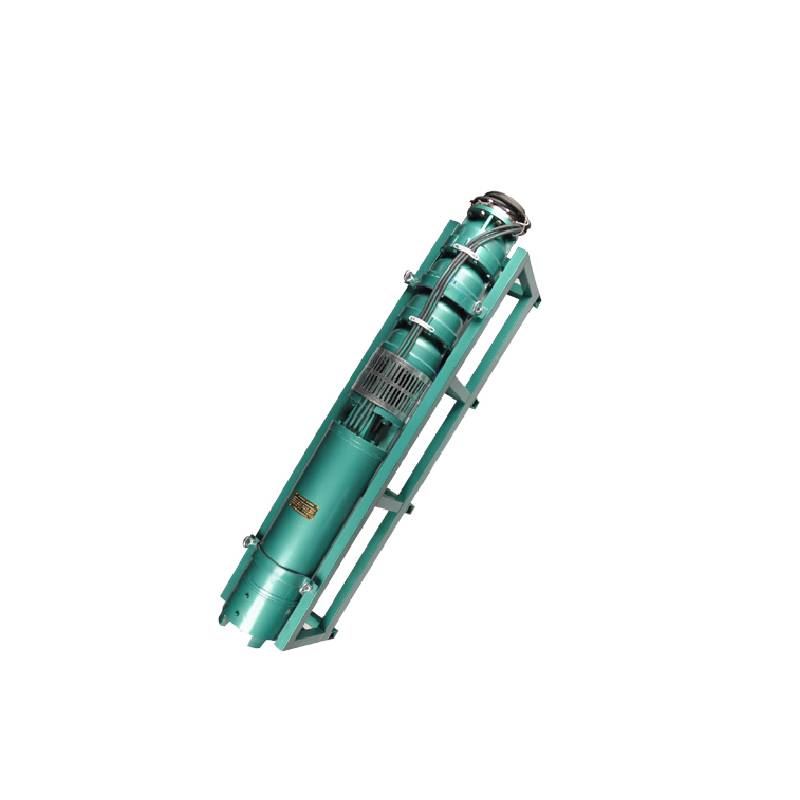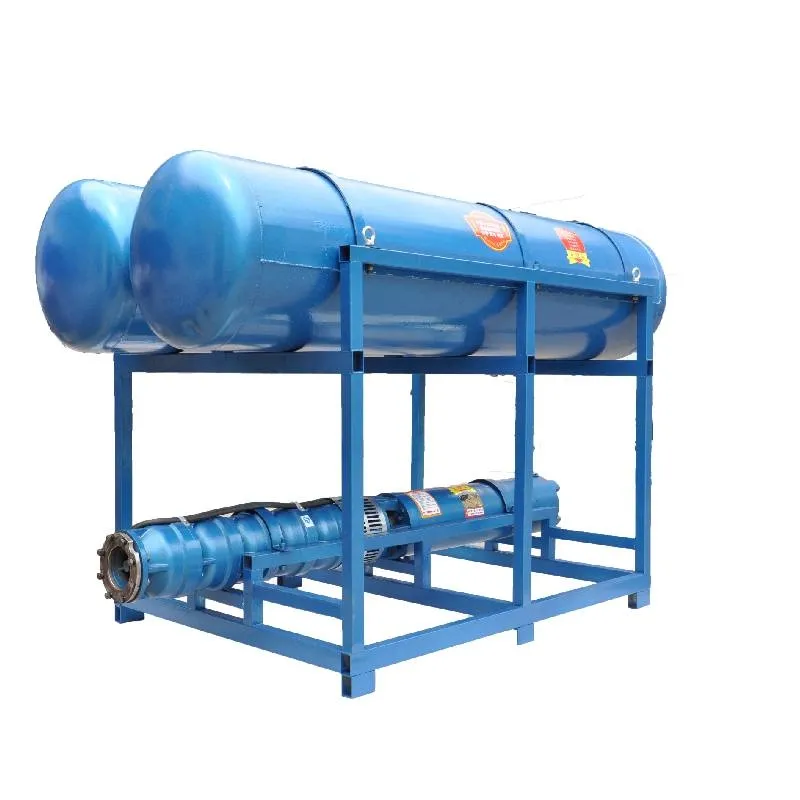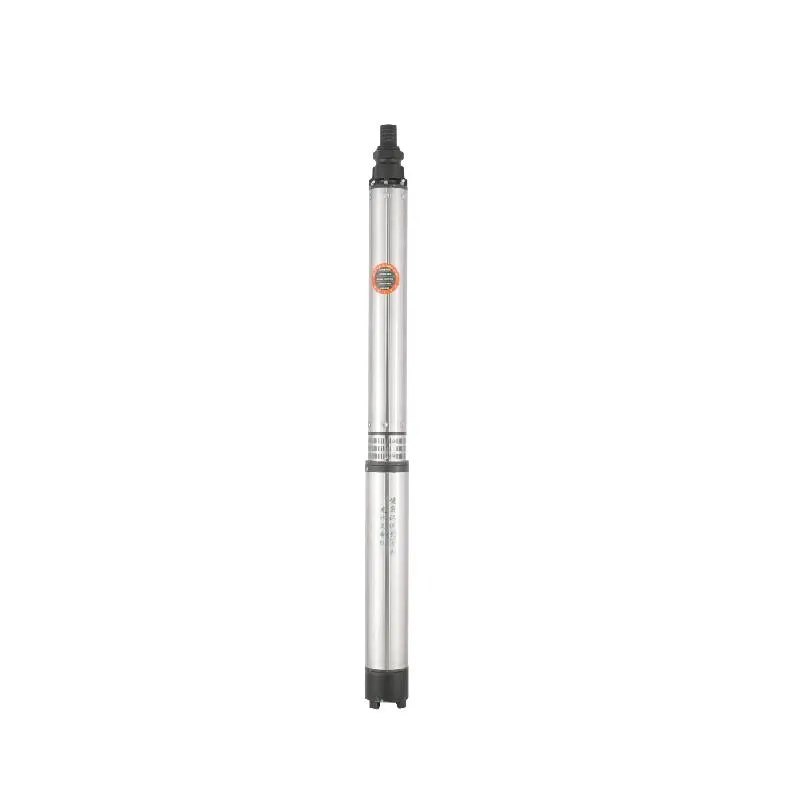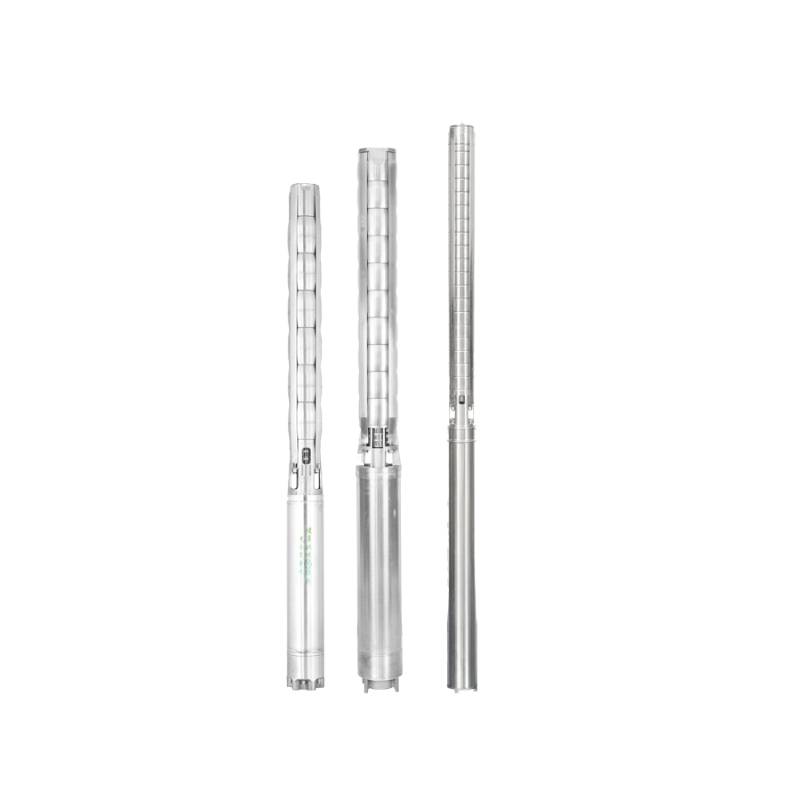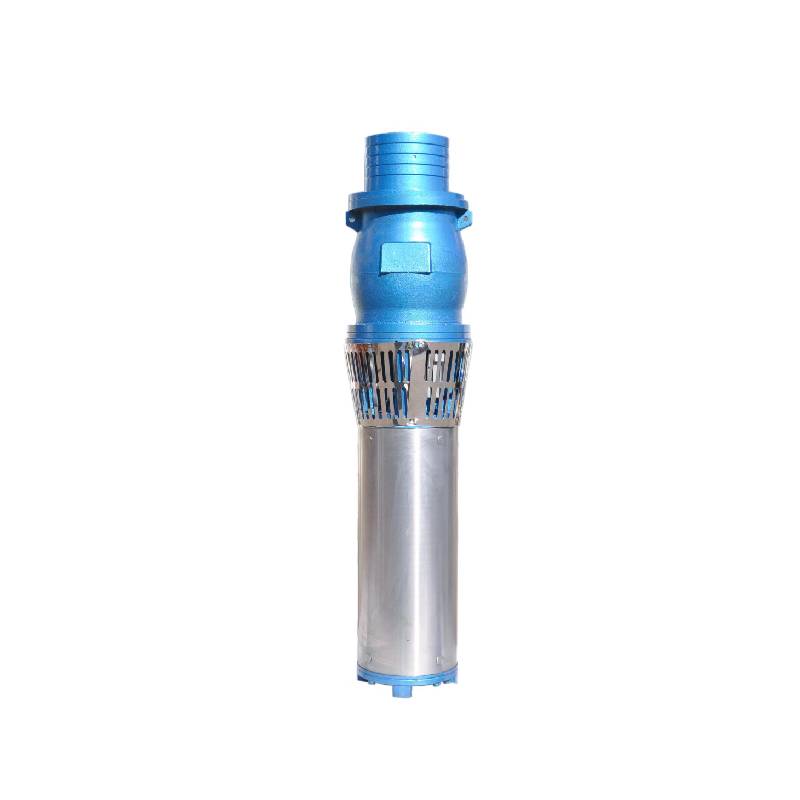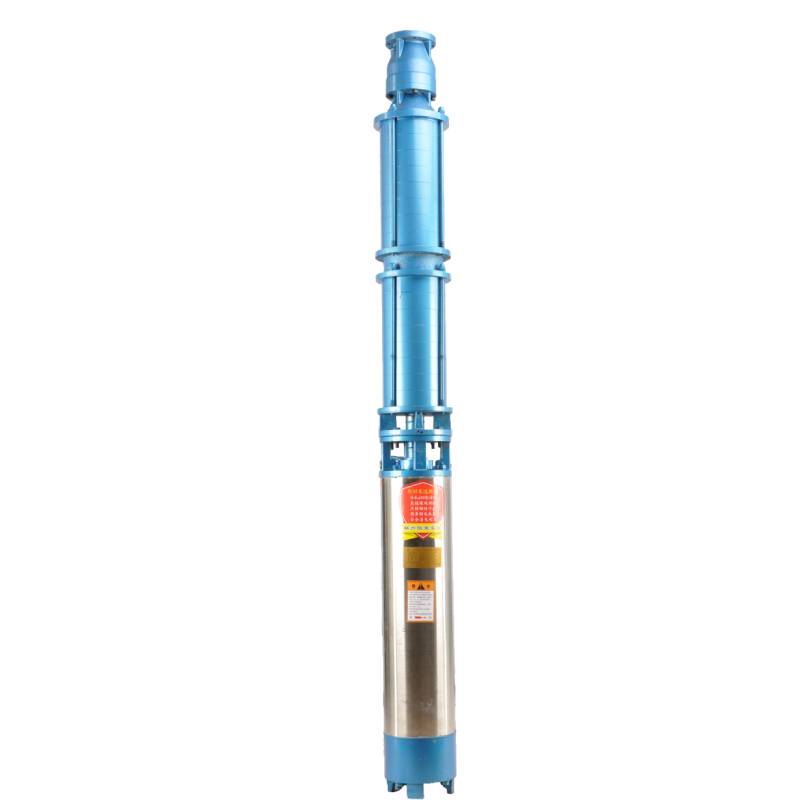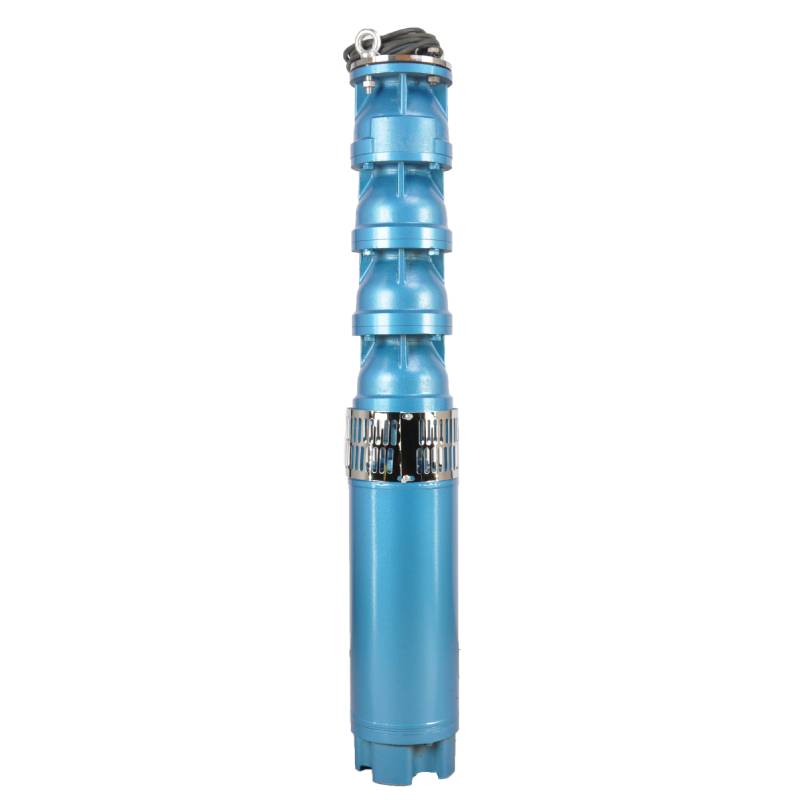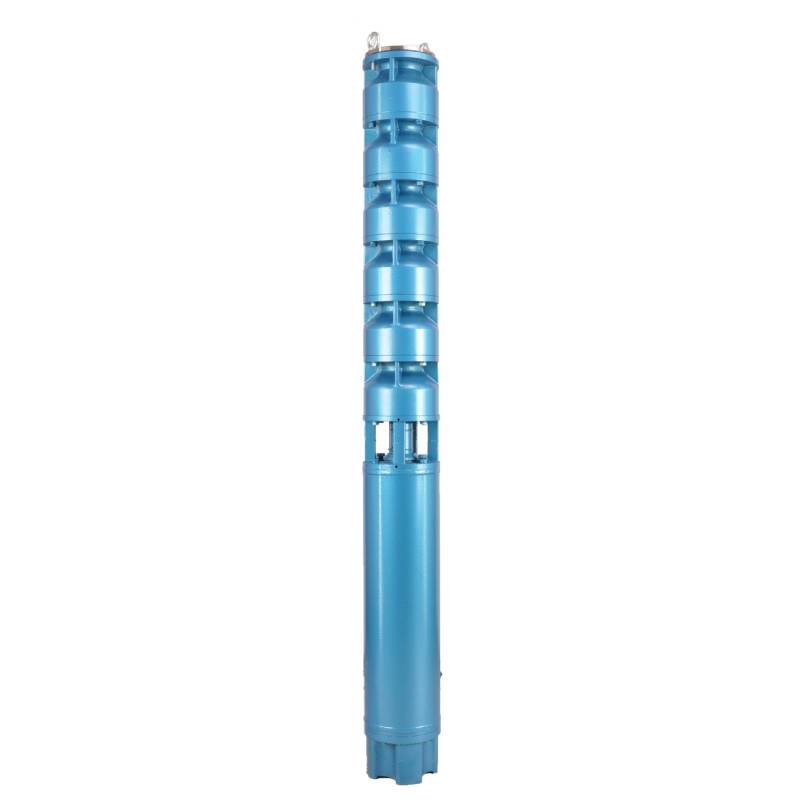QJP series special fountain pump is a fountain pump with higher efficiency developed by our factory. The motor core of the pump is made of high quality cold rolled silicon steel, which makes the pump have good magnetic permeability and will not produce heat when starting frequently. The two ends of the motor rotor are equipped with water-lubricated alloy copper sleeves instead of ball bearings, thus avoiding the problem of easy rust of ball bearings and burnout of motor due to lack of oil. 0JP series pump is also equipped with a variety of intelligent functions, such as over-temperature protection, anti-dry burning protection, etc., to ensure the safe operation of the pump. The pump is suitable for fountain decoration in landscape engineering, square, garden and other different occasions, providing users with efficient and reliable pumping solutions.
1, cyflenwad pŵer: AC tri cham 380V (goddefgarwch + / - 5%), 50HZ (goddefgarwch + / - 1%).
2, ansawdd dŵr:
(1) water temperature is not higher than 20 °C;
(2) nid yw cynnwys amhureddau solet (cymhareb màs) yn fwy na 0.01%;
(3) PH gwerth (pH) 6.5-8.5;
(4) nid yw cynnwys hydrogen sylffid yn fwy na 1.5mg/L;
(5) nid yw cynnwys ïon clorid yn fwy na 400mg / L.
3, mae'r modur ar gau neu strwythur gwlyb llawn dŵr, cyn ei ddefnyddio rhaid i'r ceudod modur tanddwr fod yn llawn dŵr glân, i atal ffug llawn, ac yna tynhau'r chwistrelliad dŵr, bolltau rhyddhau aer, fel arall ni chaniateir defnyddio
4, rhaid i bwmp tanddwr gael ei foddi'n llwyr yn y dŵr, nid yw'r dyfnder deifio yn fwy na 70m, nid yw gwaelod y pwmp tanddwr o waelod y ffynnon yn llai na 3m.
5, dylai llif dŵr y ffynnon allu bodloni'r allbwn dŵr pwmp tanddwr a gweithrediad parhaus, dylid rheoli allbwn dŵr y pwmp tanddwr ar 0.7 - 1.2 gwaith y llif graddedig.
6, dylai'r ffynnon fod yn syth, ni all y pwmp tanddwr gael ei ddefnyddio na'i ddympio, dim ond defnydd fertigol.
7, rhaid i'r pwmp tanddwr gael ei gydweddu â'r cebl yn unol â'r gofynion, a'r ddyfais amddiffyn gorlwytho allanol.
8, mae'r pwmp wedi'i wahardd yn llym heb beiriant prawf no-load dŵr
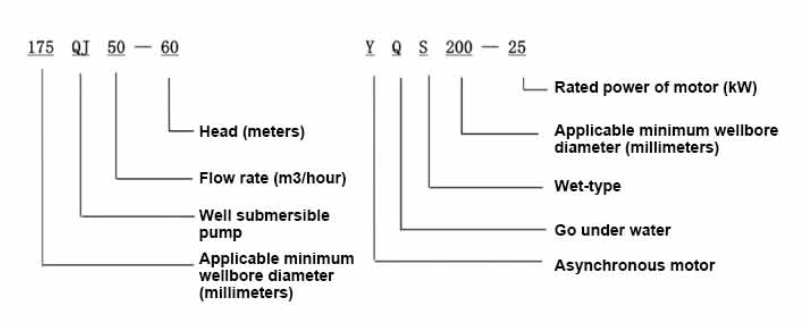
| Model | Llif (m3/h) | Pen (m) |
Cyflymder cylchdroi (newid/pwynt) |
Pwmp dŵr(%) | Allfa diamedr (mm) |
Yn berthnasol yn dda diamedr (mm) |
Wedi'i raddio pŵer (KW) |
Wedi'i raddio foltedd(V) |
Wedi'i raddio cerrynt (A) |
Effeithlonrwydd modur (%) | power factorcosφ | Uned Maint mwyaf rheiddiol (mm) |
Sylw | |||||||||
| 150QJ5-100 | 5 | 100 | 2850 | 58 | 40 | 150 | 3 | 380 | 7.9 | 74.0 | 0.78 | 143 | ||||||||||
| 150QJ5-150 | 5 | 150 | 2850 | 58 | 40 | 150 uchod | 4 | 380 | 10.25 | 75.0 | 0.79 | 143 | ||||||||||
| 150QJ5-200 | 200 | 5.5 | 13.74 | 76.0 | 0.8 | |||||||||||||||||
| 150QJ5-250 | 250 | 7.5 | 18.5 | 77.0 | 0.8 | |||||||||||||||||
| 150QJ5-300 | 300 | 9.2 | 22.12 | 78.0 | 0.81 | |||||||||||||||||
| 150QJ10-50 | 10 | 50 | 2850 | 63 | 50 | 150uchod | 3 | 380 | 7.9 | 74.0 | 0.78 | 143 | ||||||||||
| 150QJ10-66 | 66 | 4 | 10.25 | 75.0 | 0.79 | |||||||||||||||||
| 150QJ10-78 | 78 | 4 | 10.25 | 75.0 | 0.79 | |||||||||||||||||
| 150QJ10-84 | 84 | 5.5 | 13.74 | 76.0 | 0.8 | |||||||||||||||||
| 150QJ10-91 | 91 | 5.5 | 13.74 | 76.0 | 0.8 | |||||||||||||||||
| 150QJ10-100 | 100 | 5.5 | 13.74 | 76.0 | 0.8 | |||||||||||||||||
| 150QJ10-128 | 128 | 7.5 | 18.5 | 77.0 | 0.8 | |||||||||||||||||
| 150QJ10-150 | 150 | 7.5 | 18.5 | 77.0 | 0.8 | |||||||||||||||||
| 150QJ10-200 | 200 | 11 | 26.28 | 78.5 | 0.81 | |||||||||||||||||
| 150QJ10-250 | 250 | 13 | 30.87 | 79.0 | 0.81 | |||||||||||||||||
| 150QJ10-300 | 300 | 15 | 35.62 | 79.0 | 0.81 | |||||||||||||||||
| 150QJ15-33 | 15 | 33 | 2850 | 63 | 50 | 150uchod | 3 | 380 | 7.9 | 74.0 | 0.78 | 143 | ||||||||||
| 150QJ15-42 | 42 | 4 | 10.25 | 75.0 | 0.79 | |||||||||||||||||
| 150QJ15-50 | 50 | 4 | 10.25 | 75.0 | 0.79 | |||||||||||||||||
| 150QJ15-60 | 60 | 5.5 | 13.74 | 76 | 0.8 | |||||||||||||||||
| 150QJ15-65 | 65 | 5.5 | 13.74 | 76.0 | 0.8 | |||||||||||||||||
| 150QJ15-72 | 72 | 5.5 | 13.74 | 76.0 | 0.8 | |||||||||||||||||
| 150QJ15-81 | 81 | 7.5 | 18.5 | 77.0 | 0.8 | |||||||||||||||||
| 150QJ15-90 | 90 | 7.5 | 18.5 | 77.0 | 0.8 | |||||||||||||||||
| 150QJ15-98 | 98 | 7.5 | 18.5 | 77.0 | 0.8 | |||||||||||||||||
| 150QJ15-106 | 106 | 9.2 | 22.12 | 78.0 | 0.81 | |||||||||||||||||
| 150QJ15-114 | 114 | 9.2 | 22.12 | 78.0 | 0.81 | |||||||||||||||||
| 150QJ15-130 | 130 | 11 | 26.28 | 78.5 | 0.81 | |||||||||||||||||
| 150QJ15-146 | 146 | 13 | 30.87 | 79.0 | 0.81 | |||||||||||||||||
| 150QJ15-162 | 162 | 13 | 30.87 | 79.0 | 0.81 | |||||||||||||||||
| 150QJ15-180 | 180 | 15 | 35.62 | 79.0 | 0.81 | |||||||||||||||||
| 150QJ20-26 | 20 | 26 | 2850 | 64 | 50 | 150uchod | 3 | 380 | 7.9 | 74.0 | 0.78 | 143 | ||||||||||
| 150QJ20-33 | 33 | 3 | 7.9 | 74.0 | 0.78 | |||||||||||||||||
| 150QJ20-39 | 20 | 39 | 2850 | 64 | 50 | 150uchod | 4 | 380 | 10.25 | 75.0 | 0.79 | 143 | ||||||||||
| 150QJ20-52 | 52 | 5.5 | 13.74 | 76.0 | 0.8 | |||||||||||||||||
| 150QJ20-65 | 65 | 7.5 | 18.5 | 77.0 | 0.8 | |||||||||||||||||
| 150QJ20-78 | 78 | 7.5 | 18.5 | 77.0 | 0.8 | |||||||||||||||||
| 150QJ20-91 | 91 | 9.2 | 22.12 | 78.0 | 0.81 | |||||||||||||||||
| 150QJ20-98 | 98 | 9.2 | 22.12 | 78.0 | 0.81 | |||||||||||||||||
| 150QJ20-104 | 104 | 11 | 26.28 | 78.5 | 0.81 | |||||||||||||||||
| 150QJ20-111 | 111 | 11 | 26.28 | 78.5 | 0.81 | |||||||||||||||||
| 150QJ20-130 | 130 | 13 | 30.87 | 79.0 | 0.81 | |||||||||||||||||
| 150QJ20-143 | 143 | 13 | 30.87 | 79.0 | 0.81 | |||||||||||||||||
| 150QJ20-156 | 156 | 15 | 35.62 | 79.0 | 0.81 | |||||||||||||||||
| 150QJ20-182 | 182 | 18.5 | 43.12 | 79.5 | 0.82 | |||||||||||||||||
| 150QJ25-24 | 25 | 24 | 2850 | 64 | 65 | 150uchod | 3 | 380 | 7.9 | 74.0 | 0.78 | 143 | ||||||||||
| 150QJ25-32 | 32 | 4 | 10.25 | 75.0 | 0.79 | |||||||||||||||||
| 150QJ25-40 | 40 | 5.5 | 13.74 | 76.0 | 0.8 | |||||||||||||||||
| 150QJ25-48 | 48 | 5.5 | 13.74 | 76.0 | 0.8 | |||||||||||||||||
| 150QJ25-56 | 56 | 7.5 | 18.5 | 77.0 | 0.8 | |||||||||||||||||
| 150QJ25-64 | 64 | 7.5 | 18.5 | 77.0 | 0.8 | |||||||||||||||||
| 150QJ25-72 | 72 | 9.2 | 22.12 | 78.0 | 0.81 | |||||||||||||||||
| 150QJ25-77 | 77 | 9.2 | 22.12 | 78.0 | 0.81 | |||||||||||||||||
| 150QJ25-84 | 84 | 11 | 26.28 | 78.5 | 0.81 | |||||||||||||||||
| 150QJ25-96 | 96 | 11 | 26.28 | 78.5 | 0.81 | |||||||||||||||||
| 150QJ25-104 | 104 | 13 | 30.87 | 79.0 | 0.81 | |||||||||||||||||
| 150QJ25-110 | 110 | 13 | 30.87 | 79.0 | 0.81 | |||||||||||||||||
| 150QJ25-120 | 120 | 15 | 35.62 | 79.0 | 0.81 | |||||||||||||||||
| 150QJ25-128 | 128 | 15 | 35.62 | 79.0 | 0.81 | |||||||||||||||||
| 150QJ25-136 | 136 | 18.5 | 43.12 | 79.5 | 0.82 | |||||||||||||||||
| 150QJ25-154 | 154 | 18.5 | 43.12 | 79.5 | 0.82 | |||||||||||||||||
| 150QJ32-18 | 32 | 18 | 2850 | 66 | 80 | 150uchod | 3 | 380 | 7.9 | 74.0 | 0.78 | 143 | ||||||||||
| 150QJ32-24 | 24 | 4 | 10.25 | 75.0 | 0.79 | |||||||||||||||||
| 150QJ32-30 | 30 | 5.5 | 13.74 | 76.0 | 0.8 | |||||||||||||||||
| 150QJ32-36 | 36 | 5.5 | 13.74 | 76.0 | 0.8 | |||||||||||||||||
| 150QJ32-42 | 32 | 42 | 2850 | 66 | 80 | 150uchod | 7.5 | 380 | 18.5 | 77.0 | 0.8 | 143 | ||||||||||
| 150QJ32-54 | 54 | 9.2 | 22.12 | 78.0 | 0.81 | |||||||||||||||||
| 150QJ32-66 | 66 | 11 | 26.28 | 78.5 | 0.81 | |||||||||||||||||
| 150QJ32-72 | 72 | 13 | 30.87 | 79.0 | 0.81 | |||||||||||||||||
| 150QJ32-84 | 84 | 13 | 30.87 | 79.0 | 0.81 | |||||||||||||||||
| 150QJ32-90 | 90 | 15 | 35.62 | 79.0 | 0.81 | |||||||||||||||||
| 150QJ32-96 | 96 | 15 | 35.62 | 79.0 | 0.81 | |||||||||||||||||
| 150QJ32-114 | 114 | 18.5 | 43.12 | 79.5 | 0.82 | |||||||||||||||||
| 150QJ40-16 | 40 | 16 | 2850 | 66 | 80 | 150uchod | 3 | 380 | 7.9 | 74.0 | 0.78 | 143 | ||||||||||
| 150QJ40-24 | 24 | 5.5 | 13.74 | 76.0 | 0.8 | |||||||||||||||||
| 150QJ40-30 | 30 | 5.5 | 13.74 | 76.0 | 0.8 | |||||||||||||||||
| 150QJ40-40 | 40 | 7.5 | 18.5 | 77.0 | 0.8 | |||||||||||||||||
| 150QJ40-48 | 48 | 9.2 | 22.12 | 78.0 | 0.81 | |||||||||||||||||
| 150QJ40-56 | 56 | 11 | 26.28 | 78.5 | 0.81 | |||||||||||||||||
| 150QJ40-64 | 64 | 13 | 30.87 | 79.0 | 0.81 | |||||||||||||||||
| 150QJ40-72 | 72 | 13 | 30.87 | 79.0 | 0.81 | |||||||||||||||||
| 150QJ40-80 | 80 | 15 | 35.62 | 79.0 | 0.81 | |||||||||||||||||
| 150QJ40-96 | 96 | 18.5 | 43.12 | 79.5 | 0.82 | |||||||||||||||||
| 150QJ50-16 | 50 | 16 | 2850 | 65 | 80 | 150uchod | 4 | 380 | 10.25 | 75.0 | 0.79 | 143 | ||||||||||
| 150QJ50-22 | 22 | 5.5 | 13.74 | 76.0 | 0.8 | |||||||||||||||||
| 150QJ50-28 | 28 | 7.5 | 18.5 | 77.0 | 0.8 | |||||||||||||||||
| 150QJ50-34 | 34 | 9.2 | 22.12 | 78.0 | 0.81 | |||||||||||||||||
| 150QJ50-40 | 40 | 9.2 | 22.12 | 78.0 | 0.81 | |||||||||||||||||
| 150QJ50-46 | 46 | 11 | 26.28 | 78.5 | 0.81 | |||||||||||||||||
| 150QJ50-52 | 52 | 13 | 30.87 | 79.0 | 0.81 | |||||||||||||||||
| 150QJ50-57 | 57 | 15 | 35.62 | 79.0 | 0.81 | |||||||||||||||||
| 150QJ50-74 | 74 | 18.5 | 43.12 | 79.5 | 0.82 | |||||||||||||||||
| 150QJ50-80 | 80 | 18.5 | 43.12 | 79.5 | 0.82 | |||||||||||||||||
| 150QJ63-12 | 63 | 12 | 2850 | 60 | 80 | 150uchod | 4 | 380 | 10.25 | 75.0 | 0.79 | 143 | ||||||||||
| 150QJ63-18 | 18 | 7.5 | 18.5 | 77.0 | 0.8 | |||||||||||||||||
| 150QJ63-30 | 30 | 9.2 | 22.12 | 78.0 | 0.81 | |||||||||||||||||
| 150QJ63-36 | 36 | 11 | 26.28 | 78.5 | 0.81 | |||||||||||||||||
| 150QJ63-42 | 63 | 42 | 2850 | 60 | 80 | 150uchod | 13 | 380 | 30.87 | 79.0 | 0.81 | 143 | ||||||||||
| 150QJ63-48 | 48 | 15 | 35.62 | 79.0 | 0.81 | |||||||||||||||||
| 150QJ63-54 | 54 | 18.5 | 43.12 | 79.5 | 0.82 | |||||||||||||||||
| 150QJ15-220 | 15 | 220 | 2850 | 50 | 150uchod | 18.5 | 380 | 43.12 | 143 | |||||||||||||
| 150QJ15-260 | 260 | 20 | 49.7 | |||||||||||||||||||
| 150QJ15-300 | 300 | 25 | 56.5 | |||||||||||||||||||
| 150QJ20-210 | 20 | 210 | 2850 | 50 | 150uchod | 20 | 380 | 49.7 | 143 | |||||||||||||
| 150QJ20-240 | 240 | 25 | 56.5 | |||||||||||||||||||
| 150QJ20-290 | 290 | 30 | 66.6 | |||||||||||||||||||
| 150QJ25-175 | 25 | 175 | 2850 | 65 | 150uchod | 20 | 49.7 | 143 | ||||||||||||||
| 150QJ25-200 | 200 | 30 | 66.6 | |||||||||||||||||||
| 150QJ25-290 | 290 | 37 | 82.1 | |||||||||||||||||||
| 150QJ32-120 | 32 | 120 | 2850 | 80 | 150uchod | 20 | 380 | 49.7 | 143 | |||||||||||||
| 150QJ32-132 | 132 | 25 | 56.5 | |||||||||||||||||||
| 150QJ32-156 | 156 | 30 | 66.6 | |||||||||||||||||||
| 150QJ32-190 | 190 | 37 | 82.1 | |||||||||||||||||||
| 150QJ32-240 | 240 | 45 | 96.9 | |||||||||||||||||||
| 150QJ40-110 | 40 | 110 | 2850 | 80 | 150uchod | 20 | 380 | 49.7 | 143 | |||||||||||||
| 150QJ40-121 | 121 | 25 | 56.5 | |||||||||||||||||||
| 150QJ40-143 | 143 | 30 | 66.6 | |||||||||||||||||||
| 150QJ40-176 | 176 | 37 | 82.1 | |||||||||||||||||||
| 150QJ40-220 | 220 | 45 | 96.9 | |||||||||||||||||||
| 150QJ50-100 | 50 | 100 | 2850 | 80 | 150uchod | 20 | 380 | 49.7 | 143 | |||||||||||||
| 150QJ50-110 | 110 | 25 | 56.5 | |||||||||||||||||||
| 150QJ50-130 | 130 | 30 | 66.6 | |||||||||||||||||||
| 150QJ50-160 | 160 | 37 | 82.1 | |||||||||||||||||||
| 150QJ50-200 | 200 | 45 | 96.9 | |||||||||||||||||||
1, pwmp tanddwr yn dda ar gyfer pwmp dŵr glân, yn gwahardd y ffynnon newydd, pwmpio gwaddod a dŵr mwdlyd,
2, gradd foltedd pwmp dŵr yn dda 380/50HZ, mae angen addasu'r defnydd o raddau foltedd eraill o moduron tanddwr. Rhaid i'r cebl tanddaearol ddefnyddio cebl gwrth-ddŵr, rhaid ei gyfarparu â chyfarpar cychwyn, megis blwch dosbarthu, cychwyn nid yn barod dylai fod â swyddogaeth amddiffyn gynhwysfawr modur a ddefnyddir yn gyffredin, megis amddiffyniad gorlwytho cylched byr, amddiffyniad cam, amddiffyniad undervoltage, amddiffyn sylfaen, amddiffyniad segura , rhag ofn y bydd amodau annormal, dylai'r ddyfais amddiffyn fod yn daith gweithredu amserol.
3, mae'n rhaid i osod a defnyddio'r pwmp gael ei seilio'n ddibynadwy, yn gwahardd y switsh gwthio a thynnu pan fydd y dwylo a'r traed yn wlyb, rhaid torri'r cyflenwad pŵer i ffwrdd cyn gosod a chynnal a chadw'r pwmp, lle defnyddio'r pwmp i sefydlu " i atal sioc drydan" arwyddion amlwg:
4, i lawr y ffynnon neu cyn gosod, mae'n rhaid i'r ceudod modur gael ei lenwi â dŵr distyll neu ddŵr berw oer glân nad yw'n cyrydol, tynhau'r bollt / dŵr, y pwmp ar y rhediad prawf daear, rhaid bod i'r siambr pwmp rwber iro dŵr Bearings, cychwyn ar unwaith heb fod yn fwy nag eiliad, weld a yw'r llywio yr un fath â'r cyfarwyddyd llywio. Pan fydd y pwmp yn unionsyth, rhowch sylw i ddiogelwch, atal anaf rhag troi drosodd.
5, yn llym yn unol â darpariaethau'r lifft pwmp, ystod llif y defnydd, i atal llif isel neu rym pwmpio lifft uchel, y dwyn byrdwn a rhannau eraill o'r gwisgo, y gorlwytho modur llosgi 6, ar ôl y pwmp i lawr y ffynnon, ni ddylai mesuriad y modur i'r gwrthiant inswleiddio daear fod yn llai na 100M, ar ôl dechrau arsylwi ar y foltedd a'r cerrynt, gwiriwch inswleiddiad dirwyn y modur, boed yn unol â'r gofynion; tymheredd lleoliad storio pwmp os yw'n llai na phwynt rhewi, dylai fod yn sych y ceudod dŵr modur, atal y difrod iâ dŵr ceudod modur a achosir gan dymheredd isel.
The pump part is mainly composed of pump shaft, impeller, flow guide housing, rubber bearing, check valve body (optional) and other parts. The motor part is mainly composed of base, pressure regulating diaphragm, thrust bearing, thrust plate, lower guide bearing seat, stator, rotor, upper guide bearing seat, sand discharging ring, water inlet section, lead cable and other parts. The main features of the product include: the motor is a water-filled wet submersible three-phase asynchronous motor, the motor cavity is filled with clear water for cooling the motor and lubricating the bearing, the pressure regulating diaphragm at the bottom of the motor is used to adjust the pressure difference caused by the heating of the motor. In order to prevent the sand in the well water from entering the motor, the upper end of the motor shaft extension is installed with two oil seals, and the sand discharging ring is installed to form a sand prevention structure. In order to avoid the pump shaft jumping when starting, the pump shaft is connected with the motor shaft through a coupling, and the thrust bearing is installed at the bottom of the motor. The lubrication of the motor and the pump bearing is water lubrication, and the stator winding of the motor uses high quality submersible motor wire with high insulation performance. The pump is designed by computer CAD, with simple structure and superior technical performance.

(1) Paratoi cyn gosod:
1. Gwiriwch a yw'r pwmp tanddwr yn bodloni'r amodau defnydd a'r cwmpas a nodir yn y llawlyfr.
2. Gan ddefnyddio gwrthrych trwm gyda diamedr sy'n hafal i diamedr allanol uchaf y pwmp tanddwr, mesurwch a all diamedr mewnol y ffynnon ffitio'r pwmp tanddwr, a mesur a yw dyfnder y ffynnon yn bodloni'r gofynion gosod.
3. Gwiriwch a yw tyllu'r ffynnon yn lân ac a yw dŵr y ffynnon yn gymylog. Peidiwch byth â defnyddio pwmp trydan tanddwr i olchi mwd y pwmp welor a dŵr tywod er mwyn osgoi niwed cynamserol i'r pwmp trydan tanddwr.
4. Gwiriwch a yw lleoliad y clamp gosod welhead yn addas ac a all wrthsefyll ansawdd yr uned gyfan
5. Gwiriwch a yw'r cydrannau pwmp tanddwr wedi'u cwblhau a'u gosod yn iawn yn ôl y diagram cydosod yn y llawlyfr Tynnwch y sgrin hidlo a chylchdroi'r cyplydd i weld a yw'n cylchdroi yn hyblyg
6. Dadsgriwiwch y sgriw dŵr a llenwi'r ceudod modur â dŵr glân nad yw'n cyrydol (noder. gwnewch yn siŵr ei ffiltro), yna tynhau'r sgriw dŵr. Ar ôl 12 awr o chwistrelliad dŵr, ni ddylai ymwrthedd inswleiddio'r modur fod yn llai na 150M Q wrth ei fesur gyda bwrdd ysgwyd 500V.
7. Cable joint, cut off a 120mm rubber sleeve from one end of the outgoing cable and the matching cable with an electrician's knifethen stagger the length of the three core wires in a stepped shape, peel off a 20mm copper core, scrape of the oxide layer on theoutside of the copper wire with a knife or sand cloth, and insert the two connected wire ends in palirs.After tying the layer tightly with fine copper wire, solder it thoroughly and firmly, and sand of any. burrs on the surface. Then, forthe three joints, use polyvester insulation tape to wrap them in a semi stacked manner for three lavers. Wrap the two ends of thewrapping layer tightywith nyion thread,and then use a semi stacked method to wrap the tape for three layers. Wrap the outellayer with high-pressure insulation tape for three layers. Finally, fold the threestrands together and repeatedly wrap them for fivelayers with high-pressure tape. Each layer must be tightly tied, and the interlayer joints must be tight and fimm to prevent water frompenetrating and damaging the insulation, After wrapping, soak in water at room temperature of 20 ’c for 12 hours, and measurethe insulation resistance with a shaking table, which should not be less than 100M Ω
Mae'r diagram proses gwifrau cebl ynghlwm fel a ganlyn: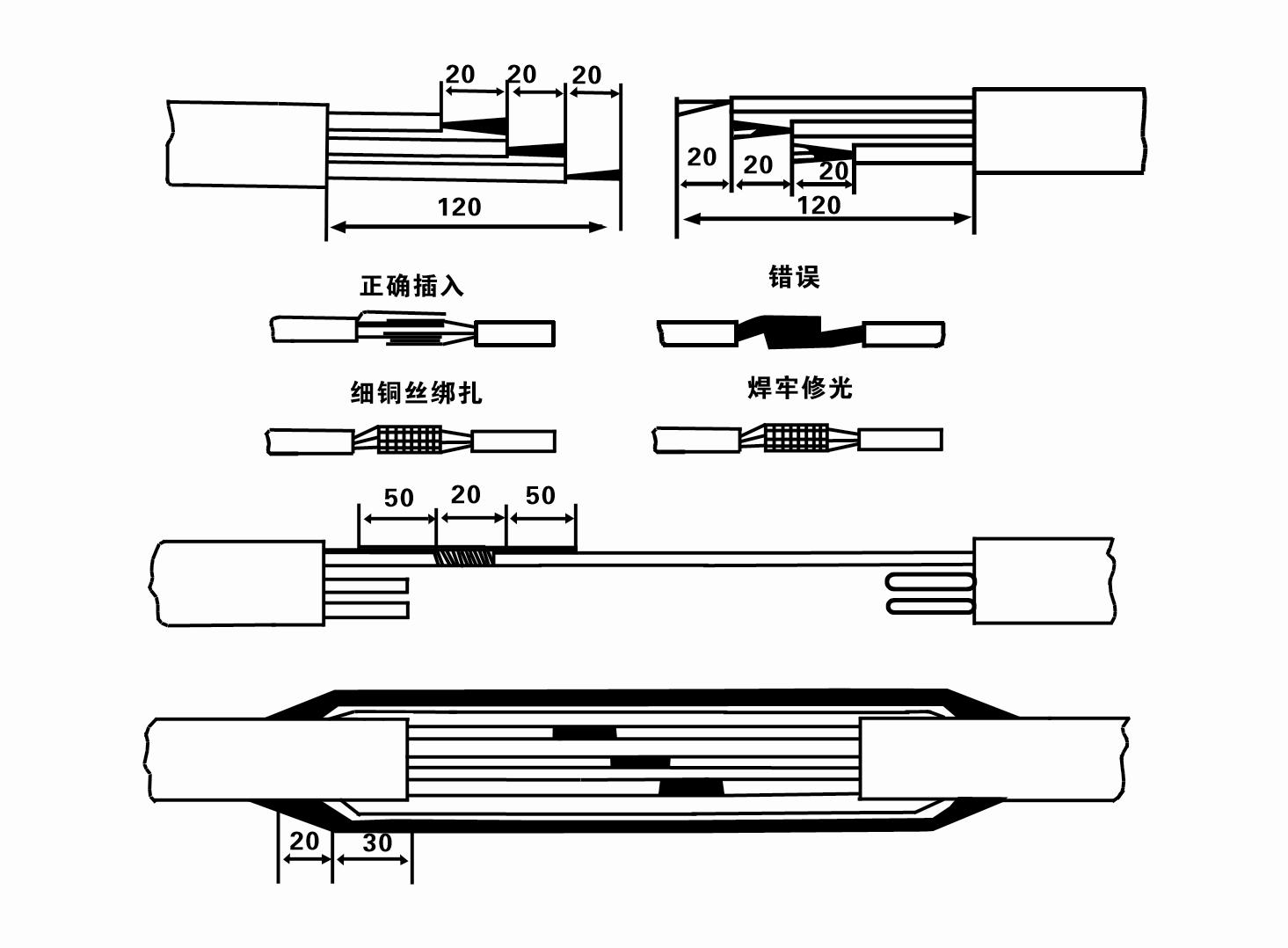
8. Defnyddiwch amlfesurydd i wirio a yw'r gwifrau tri cham wedi'u cysylltu ac a yw'r gwrthiant DC yn gyfartal yn fras.
9. Gwiriwch a yw'r cylched a chynhwysedd y trawsnewidydd yn cael eu gorlwytho, ac yna cysylltu'r switsh amddiffyn gorlwytho neu'r offer cychwyn. Gweler Tabl 2 am fodelau penodol, ac yna Arllwyswch bwced o ddŵr i'r pwmp dŵr o'r allfa pwmp dŵr i iro'r Bearings rwber yn y pwmp, ac yna gosodwch y pwmp trydan tanddwr yn unionsyth ac yn gyson.Start (dim mwy nag un eiliad) a gwirio a yw'r cyfeiriad llywio yn gyson â'r arwydd llywio. Os na, cyfnewidiwch unrhyw ddau gysylltydd o'r cebl tri cham. Yna gosodwch yr hidlydd a pharatowch i fynd i lawr y ffynnon. Os caiff ei ddefnyddio mewn achlysuron arbennig (fel ffosydd, ffosydd, afonydd, pyllau, pyllau, ac ati), rhaid i'r pwmp trydan gael ei seilio'n ddibynadwy.
(2) Offer ac offer gosod:
1. Un pâr o gadwyni codi am fwy na dwy dunnell.
2. Trybedd gydag uchder fertigol o ddim llai na phedwar metr.
3. Dau raff hongian (rhaffau gwifren) sy'n gallu dwyn pwysau o fwy nag un tunnell (gall ddwyn pwysau set gyflawn o bympiau dŵr).
4. Gosod dau bâr o clampiau (splints).
5. Wrenches, morthwylion, sgriwdreifers, offer trydanol ac offerynnau, ac ati.
(3) Gosod pwmp trydan:
1. Dangosir diagram gosod y pwmp trydan tanddwr yn Ffigur 2. Dangosir y dimensiynau gosod penodol yn Nhabl 3 "Rhestr o Dimensiynau Gosod y Pwmp Trydan Tanddwr".
2. Gellir codi pympiau trydan tanddwr â phen llai na 30 metr yn uniongyrchol i'r ffynnon gan ddefnyddio pibellau a rhaffau gwifren neu rhaffau cywarch eraill a all ddwyn pwysau llawn y peiriant cyfan, pibellau dŵr, a dŵr yn y pibellau.
3. Mae pympiau â phen o fwy na 30 metr yn defnyddio pibellau dur, ac mae'r dilyniant gosod fel a ganlyn:
①Defnyddiwch clamp i glampio pen uchaf rhan y pwmp dŵr (mae'r modur a'r pwmp dŵr wedi'u cysylltu ar hyn o bryd), codwch ef â chadwyn hongian, a'i glymu'n araf i mewn i'r ffynnon nes i chi roi'r clamp ar ben y ffynnon a thynnu'r cadwyn hongian.
② Defnyddiwch bâr arall o clampiau i glampio pibell, ei godi â chadwyn hongian 15 cm i ffwrdd o'r fflans, a'i ostwng yn araf. Rhwng fflans pibell a fflans pwmp Rhowch y pad rwber yn ei le a thynhau'r bibell a'r pwmp yn gyfartal â bolltau, cnau a wasieri gwanwyn.
③ Codwch y pwmp tanddwr ychydig, tynnwch y clamp ar ben uchaf y pwmp dŵr, clymwch y cebl yn gadarn i'r bibell ddŵr gyda thâp plastig, a'i glymu'n araf nes bod y clamp wedi'i osod ar ben y ffynnon.
④ Defnyddiwch yr un dull i glymu'r holl bibellau dŵr i'r ffynnon.
⑤ Ar ôl i'r cebl plwm-allan gael ei gysylltu â'r switsh rheoli, mae'n gysylltiedig â'r cyflenwad pŵer tri cham.
(4) Pethau i'w nodi yn ystod y gosodiad:
1. Os canfyddir ffenomen jamio yn ystod y broses bwmpio, trowch neu tynnwch y bibell ddŵr i oresgyn y pwynt jamio. Os nad yw mesurau amrywiol yn gweithio o hyd, peidiwch â gorfodi'r pwmp i lawr er mwyn osgoi difrod i'r pwmp trydan tanddwr a'r ffynnon.
2. Yn ystod y gosodiad, dylid gosod pad rwber ar fflans pob pibell a'i dynhau'n gyfartal.
3. Pan fydd y pwmp dŵr yn cael ei ostwng i'r ffynnon, dylid ei osod yng nghanol pibell y ffynnon i atal y pwmp rhag rhedeg yn erbyn wal y ffynnon am amser hir, gan achosi'r pwmp i ddirgrynu a'r modur i ysgubo a llosgi .
4. Darganfyddwch ddyfnder y pwmp dŵr i waelod y ffynnon yn ôl amodau tywod a silt y ffynnon sy'n llifo. Peidiwch â chladdu'r pwmp yn y mwd. Yn gyffredinol, nid yw'r pellter o'r pwmp dŵr i waelod y ffynnon yn llai na 3 metr (gweler Ffigur 2).
5. Ni ddylai dyfnder mynediad dŵr y pwmp dŵr fod yn llai na 1-1.5 metr o lefel y dŵr deinamig i'r nod mewnfa dŵr (gweler Ffigur 2). Fel arall, gall y Bearings pwmp dŵr gael eu niweidio'n hawdd.
6. Ni all lifft y pwmp dŵr fod yn rhy isel. Fel arall, mae angen gosod falf giât ar bibell ddŵr y ffynnon i reoli llif y pwmp ar y pwynt llif graddedig i atal y modur rhag cael ei orlwytho a'i losgi oherwydd cyfraddau llif mawr.
7. Pan fydd y pwmp dŵr yn rhedeg, dylai'r allbwn dŵr fod yn barhaus a hyd yn oed, dylai'r presennol fod yn sefydlog (o dan amodau gwaith graddedig, yn gyffredinol dim mwy na 10% o'r cerrynt graddedig), ac ni ddylai fod unrhyw ddirgryniad na sŵn. Os oes unrhyw annormaledd, dylid stopio'r peiriant i ddarganfod yr achos a'i ddileu.
8. Wrth osod, rhowch sylw i osodiad y wifren sylfaen modur (gweler Ffigur 2). Pan fydd y bibell ddŵr yn bibell ddur, ei harwain o'r clamp pen ffynnon; pan fydd y bibell ddŵr yn bibell blastig, ei arwain o farc sylfaen y pwmp trydan.
When the submersible pump is installed, recheck the insulation resistance and three-phase connectivity of the switch, and check whether there is any error in the connection between the instrument and the starting equipment. If there is no problem, you can start the test machine. After starting, observe whether the indication reading of each instrument is correct. If the rated voltage and current specified on the nameplate are exceeded, observe whether the pump has any noise or vibration. If everything is normal, you can put into operation. After the first start of the pump for four hours, it should be closed and the thermal insulation resistance of the motor should be quickly tested. Its value should not be less than 0.5 megaohm. After stopping the pump, it should be restarted after a five-minute interval to prevent the water column in the pipeline from completely reversing, resulting in the motor burning due to excessive current. After the pump is put into normal operation, in order to prolong its service life, it is necessary to check regularly whether the supply voltage, working current and insulation resistance are normal. If the following conditions are found, the machine should be shut down immediately to eliminate the fault:
1.the current exceeds 20% under the rated working conditions.
2.the dynamic water level drops to the inlet section, resulting in intermittent drainage.
3.the submersible pump vibrates violently or emits huge noise.
4.the supply voltage is lower than 340 volts.
5.a fuse is blown out.
6.the water pipe is damaged.
7.the thermal insulation resistance of the motor to the ground is less than 0.5 megaohm.
When disassembling the unit:
1.lock the cable, take off the pipeline part, and remove the line protection plate.
2.unscrew the drain bolt, empty all the water in the motor chamber.
3.remove the filter, loosen the screw on the coupling fixed motor shaft.
4.unscrew the bolt connecting the water inlet section and the motor, and separate the pump and the motor (pay attention to the leveling unit when separating to prevent the bending of the pump shaft).
5.the disassembly sequence of the pump is: (see Figure 1) water inlet section, impeller, guide housing, rotor, impeller. Check the valve body. When removing the impeller, use special tools to loosen the conical sleeve fixed on the impeller. In the process of disassembly and assembly, avoid bending the pump shaft and damaging various parts.
6.the disassembly process of the motor is: (see Figure 1) put the motor on the platform, remove the nut, base, shaft head lock nut, thrust plate, key, lower guide rail, support seat, and tie rod bolt from the bottom of the motor in order, and then take out the rotor (be careful not to damage the wiring harness), and finally remove the connecting part and the upper guide rail bearing seat. When assembling the unit: before assembly, rust and dirt on each part should be cleaned and sealant coated on each mating surface and fastener, then assembled in reverse order of disassembly (motor shaft movement after assembly is about 1 mm), after assembly, coupling should be flexible, then put on the filter for testing. Each submersible pump running for one year, or if the running time is less than one year but has been immersed for two years, it must be disassembled and inspected according to Article 5 to replace worn parts.
1, rhowch y dŵr allan yn y ceudod modur (yn enwedig yn y gaeaf i atal y modur rhag rhewi), a chlymwch y cebl yn dda.
2, store in an indoor room without corrosive substances and gases, with a temperature below 40 °C.
3, dylai defnydd hirdymor roi sylw i atal rhwd pympiau tanddwr.
- Impeller
- Llawes siafft
- Llawes siafft rwber
-
Modrwy selio
01 Cymeriant dŵr ffynnon dwfn
02 Cyflenwad dŵr uchel
03 cyflenwad dŵr mynydd
04 twr dwr
05 Dyfrhau amaethyddol
06 dyfrhau gardd
07 cymeriant dŵr afon
08 dŵr domestig

